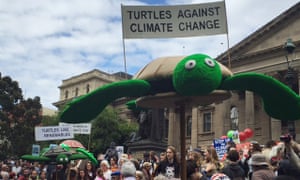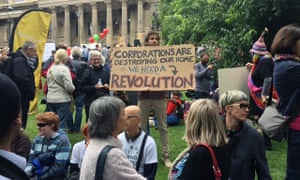Extract from The Guardian
Thousands of people march through Melbourne’s
city centre in one of many climate change protests that will take
place across the world this weekend
Protesters gather in front of Melbourne’s state
library as part of the climate change march on Friday. Photograph:
Melissa Davey for the Guardian
Friday 27 November 2015 19.17 AEDT
Thousands of people were marching through
Melbourne’s CBD on Friday evening in what is expected to the
largest in a series of climate change protests being held throughout
Australia over the weekend.
They gathered in front of the state library and,
as the lawns filled with protesters putting finishing touches on
their placards, they took to the surrounding roads just in time for
peak hour.
Environmentalists, unionists, religious
organisations, youth groups, doctors, Indigenous organisations, and
people from the aid and development sector were part of the crowd.
Police estimates put the crowd numbers by the end of the night at
about 40,000, but organisers said 60,000 turned out for the event.
Marching bands and Indigenous dancers weaved among
them, undeterred by the blustery weather.
Protesters at the start of the climate rally.
Photograph: Melissa Davey for the Guardian
Climate change marches will also take place
throughout
the world
over the weekend, to call for a transition to 100% clean energy and
an end to burning fossil fuels, as Paris prepares to host the United
Nations climate summit next month.
The climate change campaign manager at the
Australian Conservation Foundation, Victoria McKenzie-McHarg, was
among the Melbourne
protesters and told Guardian Australia the series of marches would
prove a crucial moment in the climate movement.
“By coming together in this way, we are showing
that we have strong expectations for action, and that we expect more
from our leaders, who we believe need to get on to the job of
creating a cleaner, better future,” she said.
“The prime minister [Malcolm Turnbull] seems to
have recognised opportunities with new clean technologies, but there
has been no improvement in government policy. This government has
supported one of the largest coal mines in Australia, Adani,
to go ahead, and is taking our old and completely inadequate
pollution reduction targets to the Paris negotiations.
“We need to see much stronger targets from the
government in line with limiting global warming to less than 1.5
degrees.”
Amelia Telford, the national director of the SEED
Indigenous Youth Climate Network, said the fossil fuel industry was
devastating Indigenous Australian culture.
“The loss of Aboriginal land, cultures and
livelihoods is at the core of the climate crisis, with Aboriginal and
Torres Strait Islander people forced off our land due to extractive
industries that fuel climate change, and increasingly by the
devastating impacts of sea level rise, drought and reduced access to
clean water,” she said.
It was something Sixta Mambor, from West Papua,
had seen Indigenous people in her country suffer from. She joined the
Victorian protesters to highlight their plight.
“Papua has among the highest amount of mining in
the world,” she said.
The
Melbourne rally is the first big one in a weekend of global marches.
Photograph: Melissa Davey for the Guardian
“The waste from the mining is going into the
rivers and contaminating the water that people use for cooking and
daily living, the water that children swim in. Rio Tinto is taking
everything, and are giving nothing back to the Indigenous people to
compensate.”
On Saturday, marches will be held in the Domain in
Queen’s Park in Brisbane from 9.30am, and Stokes Hill Wharf in
Darwin from 4.30pm On Sunday, people will rally at the Domain in
Sydney from 12.30pm, Ester Lipman Gardens in Adelaide from 11am,
Wellington Square in Perth from 1pm, Parliament Lawns in Hobart from
1pm and Parliament Lawns in Canberra from noon.
Marches are also being held in
dozens of regional and rural areas.
A similar march was held last
September during a global campaign where hundreds of thousands of
people across 150 countries took part in protests on one weekend.
The president of the Royal Australasian College of
Physicians, Professor Nick Talley, urged doctors to join the marches.
The college co-ordinates the group Doctors for
Climate Action, a campaign led by physicians that highlights the
impact of climate change on health. Many from the group could be seen
at the Melbourne rally.
“Physicians want the community and our leaders
to recognise that the risks to personal health from climate change
are significant, particularly among the vulnerable, including
children, the elderly and those suffering with chronic illnesses,”
Talley said.
“We are joining with the community at people’s climate marches to call for leaders to commit to real action to combat the health impacts of climate change.”
“We are joining with the community at people’s climate marches to call for leaders to commit to real action to combat the health impacts of climate change.”



No comments:
Post a Comment